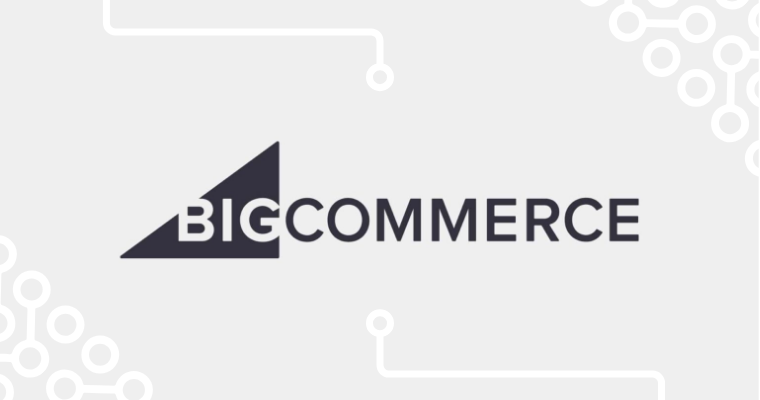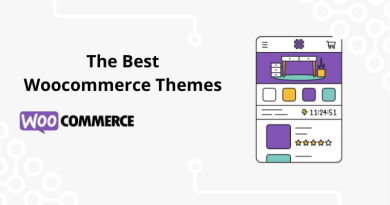What is BigCommerce? Pricing, Benefits and Review
Designed with a user-friendly interface, BigCommerce caters to the requirements of large-scale online businesses with substantial revenue streams, seeking superior power, functionality, and flexibility.
While its primary focus is on serving large companies and multinationals in both B2C and B2B sectors, BigCommerce also offers an Essentials version, equipped with a range of features, to address the needs of small businesses and emerging online store proprietors.
In this review of BigCommerce, we explore the strengths and weaknesses of this e-commerce platform, assessing its suitability for establishing your online store.
A commendable eCommerce platform is one that prioritizes its customers and consistently innovates to remain current, and BigCommerce excels in understanding and implementing this principle.
What is BigCommerce and How Does It Operate?
BigCommerce is a highly popular online store builder in the United States and is present in over 150 countries. It collaborates with successful e-commerce companies and well-known brands such as Samsung, Puma, Dell, and many more.
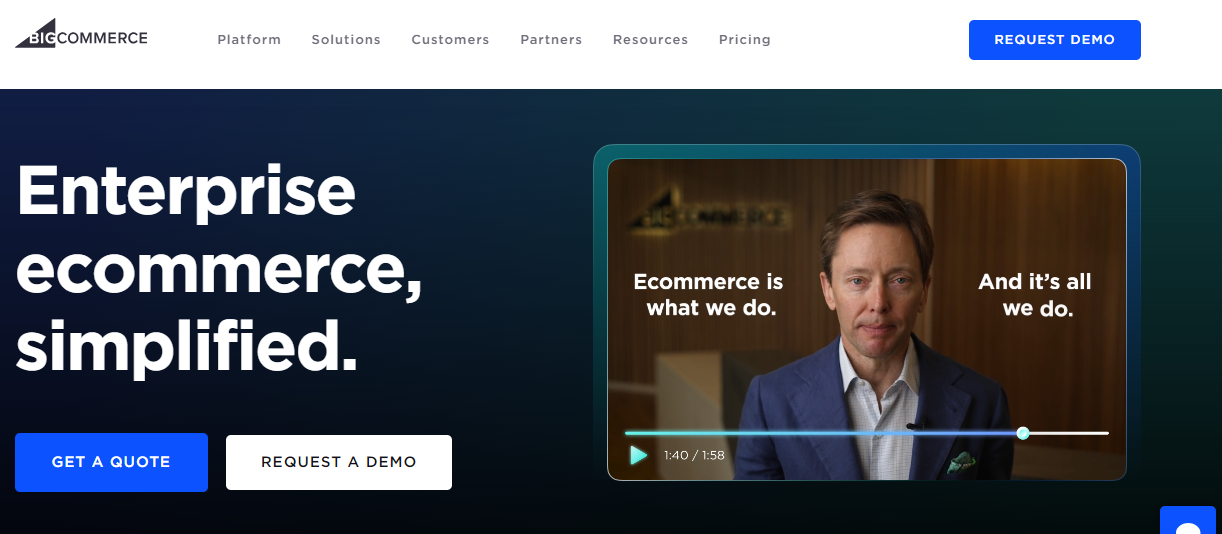
As an Open SaaS solution, BigCommerce allows you to save time and maintenance costs compared to other open-source solutions while maintaining customization options and the ability to connect with other systems through its extensive library of APIs and SDKs.
It is an open and highly modular platform, allowing the back-end to be independent of the front-end to achieve maximum platform performance with the option to customize the visual interface. This can be achieved through custom developments or integrations with other CMS, including WordPress.
Furthermore, it includes all the expected features of a platform dedicated to creating an online store, from web design to the integration of the most popular e-commerce tools, as well as other business systems such as ERP, PIM, CRM, or CMS.
For Whom is BigCommerce Intended?
BigCommerce is a platform initially designed for large companies engaged in B2C and B2B eCommerce, but it is also suitable for small businesses and entrepreneurs through its Essentials version.
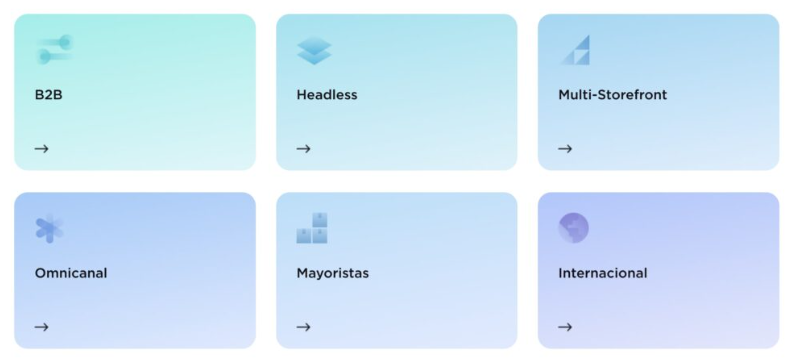
- For Entrepreneurs and Small Businesses: Create an online store with a professional design.
- For B2B and Omnichannel Sellers: Sell and distribute your products to retailers through an online store, price lists, and B2B processes. Also, conduct sales on marketplaces such as eBay, Amazon, or Etsy, utilizing B2B price lists.
- For Global Customers: Establish various virtual stores and locations tailored to any audience, region, or segment.
Our recommendation is to use BigCommerce if you are seeking a solution where you don’t have to worry about maintenance and security, ensuring the secure acceptance of online payments.
You can explore examples of BigCommerce online stores for inspiration.
Pricing Plans for BigCommerce
BigCommerce offers four plans, all eligible for a 25% discount when opting for annual payments, alongside a 15-day free trial.

Standard Plan ($39/month)
The Standard plan is recommended for small and medium-sized enterprises (SMEs) or entrepreneurs looking to establish their own online store.
Priced at $39 per month for a monthly subscription or $29 per month for an annual subscription, it provides unlimited staff accounts, storage, and payment gateway usage without transaction fees.
Additionally, this plan allows seamless integration with major sales channels like eBay and Amazon, and enables sales through popular social networks such as Facebook and Instagram.
Users have the option to add up to three additional storefronts at a cost of $30 each per month, facilitating the management of multiple brands from a single account.
Furthermore, the plan includes access to point-of-sale integrations for physical purchases, including Square, Vend, and Clover.
Annual Sales Limit: $50,000/year.
Plus Plan ($105/month)
The Plus plan, building on the features of the Standard plan, incorporates tools such as abandoned cart recovery and enables customers to save credit cards for future purchases.
Priced at $105 per month for monthly payments or $79 per month for annual payments, this plan also allows for up to five additional storefronts at $50 each per month.
It provides significant value for small and medium-sized businesses engaged in sales across different regions.
Annual Sales Limit: $180,000/year.
Pro Plan ($399/month)
Geared towards BigCommerce stores with substantial sales volume, the Pro plan is priced at $399 per month for monthly payments or $299 per month for annual payments. This plan offers up to eight inventory locations and allows for the addition of seven extra storefronts at $100 each per month.
In addition to all the features included in the previous tiers, the Pro plan introduces custom product filtering capabilities and integrates Google customer reviews.
Annual Sales Limit: $400,000/year, with an additional cost of $150 per month for each additional $200,000 in sales.
BigCommerce Enterprise
The BigCommerce Enterprise plan is a customizable option, and the pricing is scalable, depending on your store’s needs and billing. In this scenario, it’s essential to reach out to the sales department to obtain a personalized quote.
Beyond the features available in lower-tier plans, the Enterprise solution enhances hosting performance and security, ensuring an uptime of 99.99%. It also provides DDoS protection and comprehensive banking security for payment processing.
Moreover, it introduces additional online payment methods such as PayPal and Single Page Checkout, B2B price lists, Unlimited API calls, and priority customer service through phone calls with a dedicated account manager.
In my opinion, the BigCommerce Enterprise plan is tailored for businesses seeking VIP support and a customized solution.
When comparing BigCommerce pricing to Shopify, both platforms have similar base prices. However, Shopify imposes transaction fees, ultimately making it a more expensive option compared to BigCommerce.
Payment Gateways
BigCommerce does not impose a transaction fee; you only need to cover the standard transaction fees associated with the most popular payment gateways.
The platform offers a selection of over 65 built-in payment gateways, featuring one-click setup, mobile payment capabilities, and support for multiple currencies.
Payment providers available in Latin America include:
- PayPal and PayPal Express.
- Stripe.
- Square.
- ApplePay.
- Amazon Pay.
- Adyen.
- Authorize.net.
- SEPA direct debit (powered by Adyen).
Additionally, BigCommerce supports multiple currencies, making it particularly beneficial for businesses planning to process international sales.
Understanding the Functionality of BigCommerce?
After exploring the details of what BigCommerce is, along with its plans and pricing, it’s time to delve into understanding the functionality of this eCommerce platform.
For this purpose, we have conducted an analysis of the Essentials version, which provides a free trial. If you are interested in the Enterprise version, you can reach out and request an online demo to gain insights into all the advanced functions and features of BigCommerce.
To begin, BigCommerce offers various solutions categorized by industry. Simply initiate the free trial and design your online store through the BigCommerce panel.
Now, let’s take a closer look at some of the key sections within the BigCommerce dashboard.
Templates
BigCommerce has introduced new customizable themes that cater to various industries. Among them, there are 12 free themes, each offering different style variants.
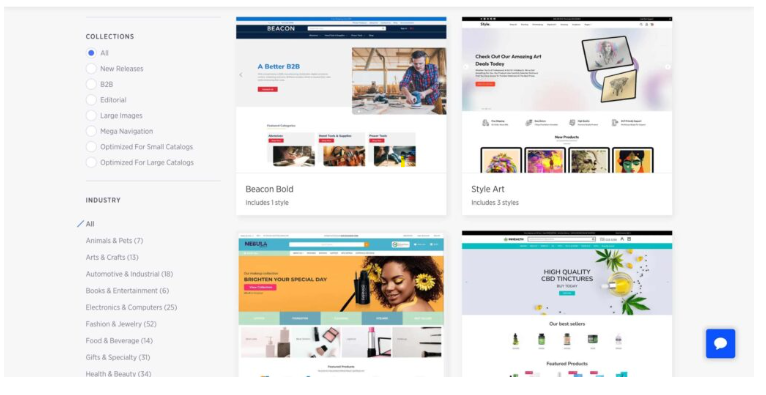
If a free theme doesn’t meet your needs, BigCommerce offers a selection of over 200 premium templates, priced between $150 and $300.
While this cost may appear relatively high, it is standard within the industry, and comparable platforms like Shopify have similar pricing structures.
To explore the available themes and templates, you can visit the BigCommerce themes and templates, where you can filter by collection and industry.
Page Builder
Highlighted features within the BigCommerce Page Builder include:
- Drag-and-drop elements (images, text, buttons, video, social networks, spacers, etc.).
- Creation of a product carousel on the homepage.
- Adjustment of the order of layers or sections on the page.
- Modification of Theme Styles.
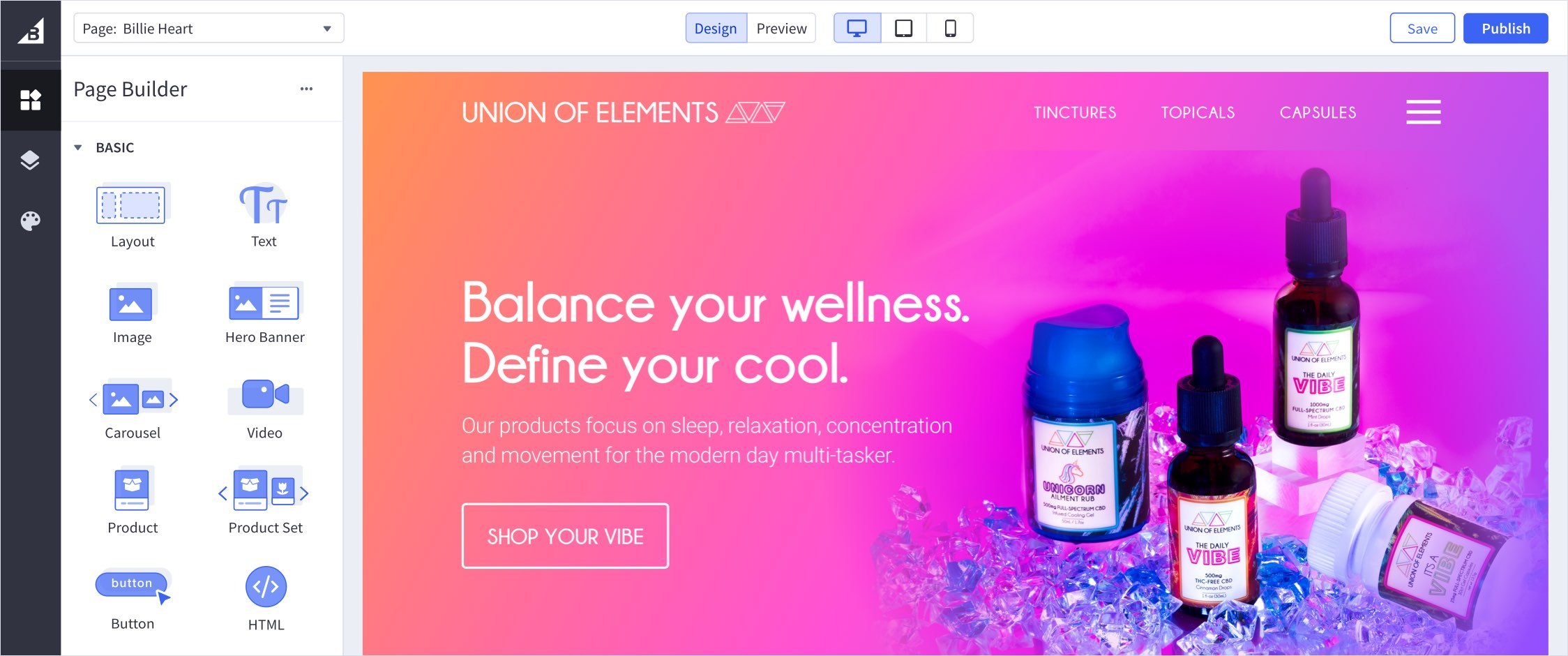
On the flip side, using the BigCommerce Page Builder allows you to preview your design for desktop, tablet, and mobile devices.
SEO Positioning
An essential factor to consider when selecting an eCommerce platform is search engine optimization (SEO).
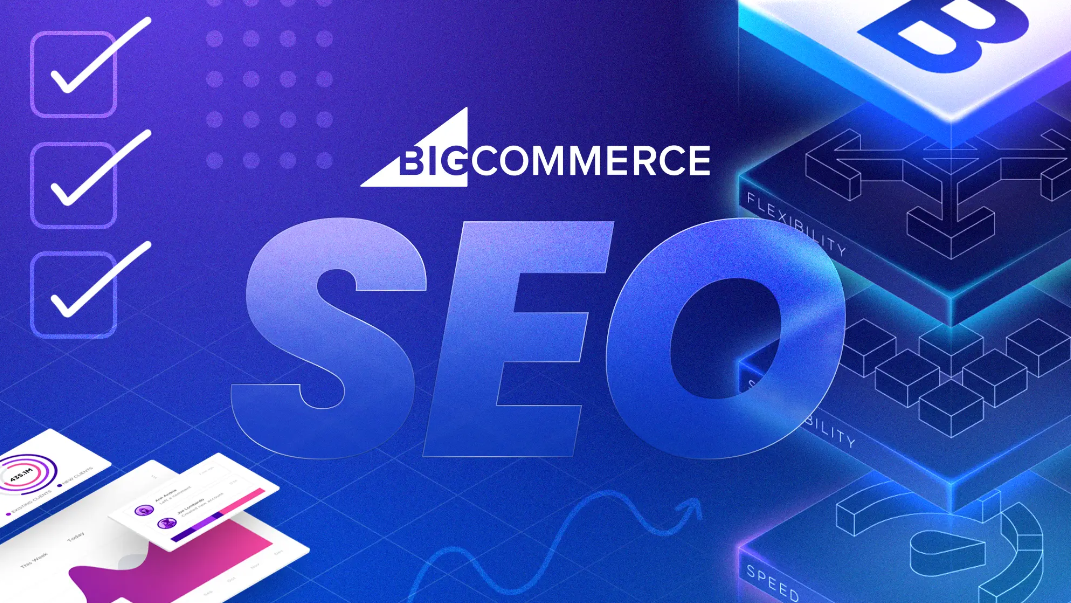
BigCommerce covers all the fundamentals of SEO, allowing you to edit product and collection page titles, meta descriptions, and headers easily.
Moreover, it provides the flexibility to create or modify the URLs for product and collection pages, along with the capability to establish 301 Redirects. A standout feature of BigCommerce is the Automatic Optimization of Images tailored for various device types.
Blog
Enhancing your SEO strategies and Google Rankings is possible through blog creation. By default, the BigCommerce platform includes a basic blog.
Utilizing its Built-In Blog tool, you can craft elementary posts to attract visitors. If you require more advanced features, the option to integrate your online store with a CMS like WordPress is available, typically through a sub-domain.
Products and Stock Management
In terms of managing products and inventory, BigCommerce has pleasantly surprised me. Its strengths lie in shipping products from multiple locations, providing distinct showcases for B2B and B2C customers, and enabling omnichannel sales through Marketplaces and Social Networks.
Product and Category Variants
A noteworthy advantage of BigCommerce is its built-in integration, allowing the sale and fulfillment of orders from different locations without the need for third-party applications. This results in fewer complications and costs across your various locations.
Adding product variants on BigCommerce is more straightforward compared to similar platforms. Moreover, it offers the ability to create price lists based on B2C or B2B customer types, particularly on Enterprise plans.
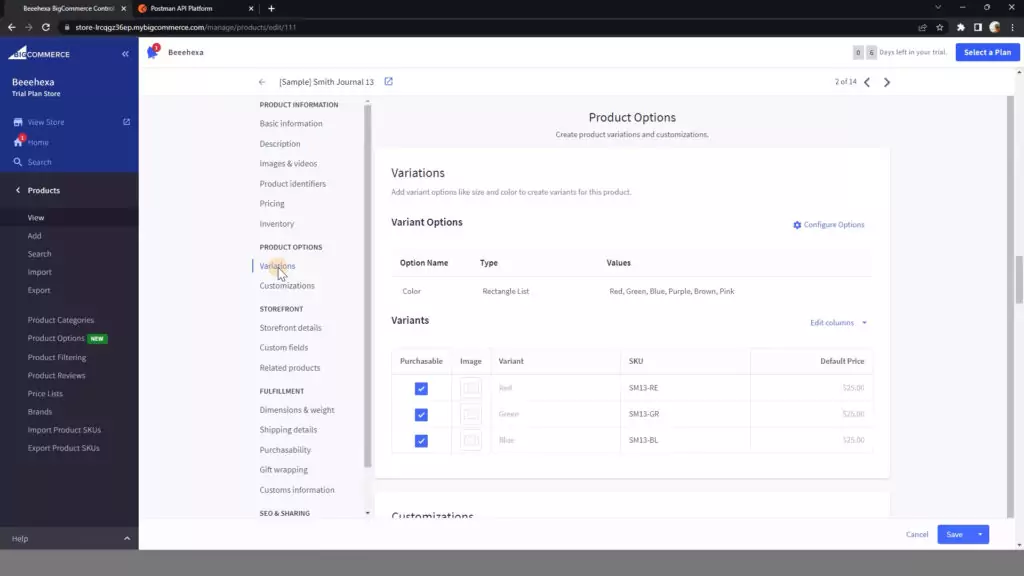
We appreciate how BigCommerce automatically generates SKUs for various variant combinations and facilitates the creation of categories by Brands. This feature is especially beneficial for multi-brand online stores and brick-and-mortar establishments.
Multichannel Sales
For those currently engaged in or planning to venture into other marketplaces, BigCommerce provides the capability to synchronize inventory and product lists with prominent sales channels such as Amazon, eBay, Google Shopping, and social networks like Facebook and Instagram.
Consequently, edits made to a product title in the BigCommerce dashboard will be automatically updated across all platforms, streamlining processes and saving time.
Marketing and Sales Strategies
BigCommerce boasts top-notch marketing and sales features, meeting the expectations of a comprehensive eCommerce platform.
Abandoned Cart Recovery
For users on the Plus plan and above, BigCommerce offers an effective tool for abandoned cart recovery. This feature allows automatic email notifications to be sent to customers who have entered their email but failed to complete an order, aiming to retrieve abandoned carts.
The Plus plan also provides the flexibility to incorporate discount codes, aiding in reducing abandoned carts, along with the option to create custom templates.
POS Integrations
For businesses with a physical store presence, BigCommerce facilitates the synchronization of inventory and centralized financial management through Point of Sale (POS) integrations.
It supports integration with leading POS systems, including Clover, Square, Epos Now, Sell, iZettle, hike, and others.
App Market
BigCommerce offers an extensive application marketplace, organized into categories covering every aspect of your online store, such as shipping, payments, security, marketing, and customer service.
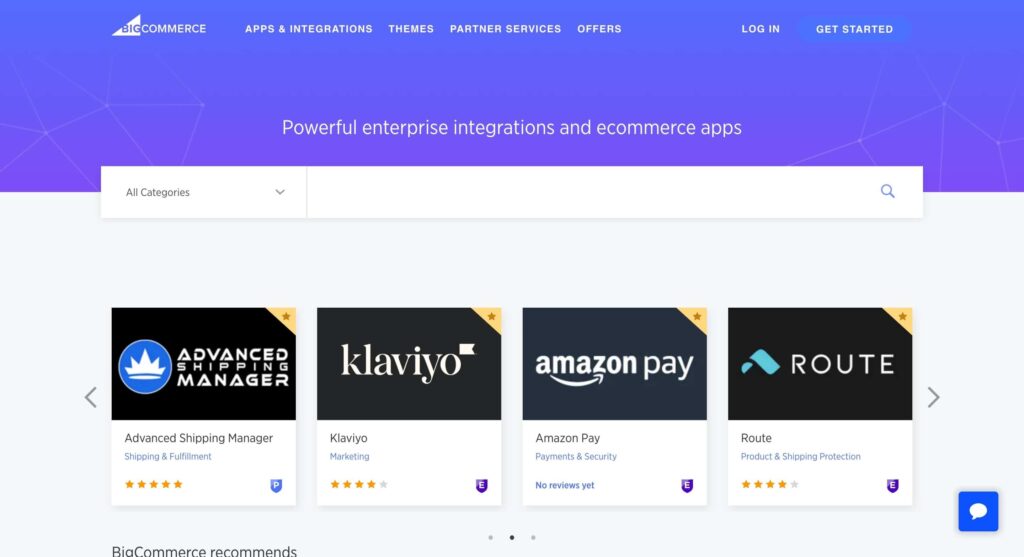
Within the BigCommerce app ecosystem, notable applications include:
- Payments & Security: Amazon Pay, PayPal, Stripe, Scalapay.
- Shipping: ShipStation, Outvio, DHL Express, Packlink PRO, Sendcloud, UPS.
- Review systems : Yotpo, Judge.me, Stamped.io., Trustpilot.
- Email Marketing : Mailchimp, Klaviyo, Omnisend, Mailchimp.
- CRM & Customer Service : LiveChat , Gorgias, Salesforce, Tidio, Zendesk.
- Other tools : Weglot (translation), Adds and Listings on Google, Searchanise (Smart Search), Shogun (Landing Pages).
In conclusion, BigCommerce offers mobile applications compatible with iOS and Android devices, enabling you to manage your BigCommerce store conveniently from anywhere.
Medium
The support provided by BigCommerce is comprehensive, featuring a Help Center, a community forum, a section for news and updates, and a platform for users to contribute their own ideas.

hould you require technical assistance, reaching out to the BigCommerce support team allows you to access customer service in Spanish too. Higher-tier plans also include phone support and a dedicated account manager.
Pros and Cons of BigCommerce
After exploring BigCommerce, this section provides an overview of the key advantages and disadvantages we’ve identified, empowering you to form your own conclusions.
Pros
- No transaction fees; you only pay the payment gateway costs.
- 24/7 customer support available on all plans.
- Integrations with multiple sales channels.
- Extensive marketplace for Email Marketing, CRM, Online Payments applications, etc.
- Unlimited products, file storage, bandwidth, and staff accounts.
- Suitable for both B2C and B2B businesses.
- Supports headless and multi-storefront commerce.

